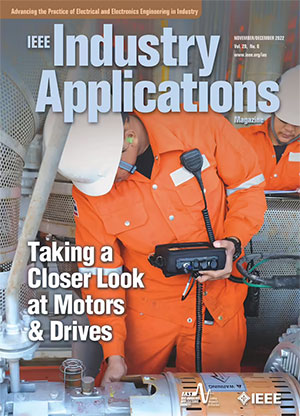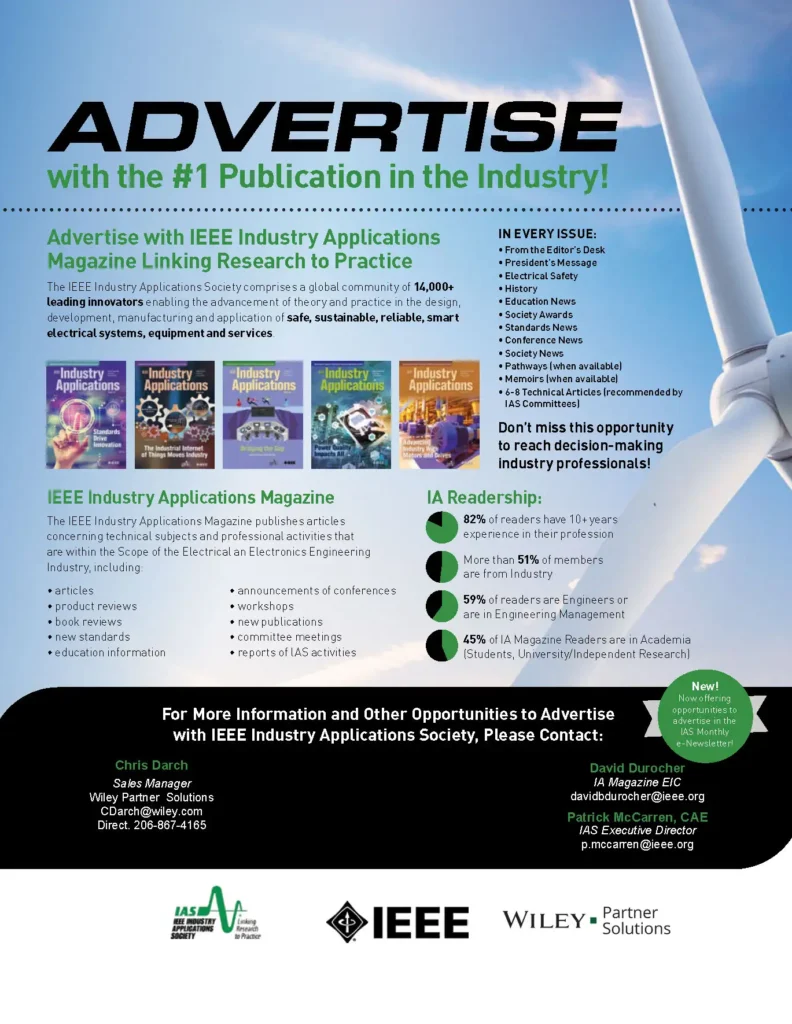
About the Magazine
Industry Applications Magazine is focused on “Advancing the Practice of Electrical and Electronics Engineering in Industry”.
Editor-in-Chief
Dave Durocher (Email EIC)
Aims and Scope
The IEEE Industry Applications Magazine publishes articles concerning technical subjects and professional activities that are within the Scope of the IEEE Industry Applications Society (IAS) and are of interest to society members. The information includes but is not limited to articles, product reviews, book reviews, new standards, education information, announcements of conferences, workshops, new publications, committee meetings, and reports of lAS activities. The Magazine communicates Executive Board actions to IAS members as required by the IAS Constitution and By-Laws.
More Details
Publication Information
Paper Submission
For its flagship Transaction and Magazine, IEEE IAS maintains a Presentation First Policy. The fundamental principle behind this policy is that face-face explanation and defense of a piece of work provides valuable feedback to authors about any limitations and opportunities to improve the work. Based on the in-person feedback gained presenting work at a conference, authors can then further improve their papers prior to publication in Transactions on Industry Applications or Industry Applications Magazine. This policy means that authors cannot directly submit papers to IEEE Industry Applications Magazine. Authors must be invited to submit their work for review by a Technical Committee after presentation at a conference. If the paper is of a suitable quality, The Technical Committee Paper Review Chair then makes a recommendation for publication in either Transactions or the Magazine. The procedures for this process depend on the relevant Technical Department and Technical Committee.
IEEE Industry Applications Magazine Advertising
IEEE Industry Applications Magazine covers the development, design, manufacture and application of electrical systems, apparatus, devices, and controls to the processes and equipment of industry; the promotion of safe, reliable, and economic installations; leadership in energy conservation and environmental, health, and safety issues; the creation of voluntary engineering standards and recommended practices; and the professional development of its membership. This bi-monthly publication has a paid circulation of 16,042 subscribers.

Print advertising opportunities are available. Download current IEEE Industry Applications Rates and Information.
For more information, please contact:
Chris Darch, Wiley Project Manager
[email protected]
+1 206-867-4165
Information for Authors
Authors wishing to have their work published in Transactions on Industry Applications or Industry Applications Magazine, must follow the processes defined by the relevant Technical Department and technical Committee. It is important to for all authors to note that authors cannot make a request for a paper to be published in the Transactions or Magazine – the Technical Committee Paper Review Chair (TCPRC) will make a recommendation to the Editors in Chief of the Transactions and Magazine, who make a final decision on publication. With its focus on “Advancing the Practice of Electrical and Electronics Engineering in Industry” papers recommended for Industry Applications Magazine will generally be more practice-oriented.
Presentation First Policy
IAS policy requires that papers be presented at approved conferences to become eligible for review and possible publication in IEEE Transactions on Industry Applications or IEEE Industry Applications Magazine. The one exception to this policy is in the case of a call for papers for a special issue of Transactions on Industry Applications. Special Issue papers may be directly submitted, according to the details in the relevant call for papers.
- If a conference is financially sponsored by IAS, all papers are eligible to be invited for review for publication in Transactions or the Magazine.
- If a conference is technically co-sponsored by IAS, the conference organizers may submit a list of selected papers eligible for further review to the Editor-in-Chief of Transactions on Industry Applications. Th technical co-sponsorship agreement defines the maximum number of papers that are eligible for further review. This is normally 20% of the papers presented at the conference, but may be 0%, 100%, or some other fraction, depending on the history of the conference and at the discretion of the IAS Executive board.
Questions about the eligibility of papers from specific conferences should be directed (jointly) to the EiC of Transactions on Industry Applications and Chair of the IAS Meetings Department.
Authors should understand that IEEE Policy prohibits verbatim publication in an IEEE periodical of conference papers that are already ‘in the literature’. To comply with this policy, authors are expected to revise conference papers submitted for review by IAS. Revisions may include additions or deletions while maintaining the original ‘intent, methods and conclusions’ of the conference paper, but must always include addition of a reference citation to the conference paper.
Technical Department Policy
Papers presented at IAS financially sponsored conferences, except those of the Industrial and Power Conversion Systems Department, generally follow a procedure whereby papers submitted to those conferences are automatically invited to have their papers reviewed for publication.
Authors of papers presented at financially sponsored conferences relevant to IPCSD should are required to request an invitation for further review, after modifying their paper, from the relevant Technical Committee Paper Review Chair (TCPRC) .
Authors of papers presented at a technically co-sponsored conference will usually receive an invitation to submit a revised paper, if their paper was identified by the conference organizers as being suitable for further review for publication.
Submission and Review Contacts
An author who wants to submit a paper for review for publication in Transactions on Industry Applications or Industry Applications Magazine, and is unsure which committee is the most relevant, or whether their paper is eligible for submission, should contact the Editor in Chief of Transactions on Industry Applications. If you know which committee you wish to submit to, you can contact the technical committee paper review chair (TCPRC) directly. A full list of paper submission and review contacts is available: 2019 Review Contacts
Review Policy
The articles in this journal are peer reviewed in accordance with the requirements set forth in the IEEE Publication Services and Products Board Operations Manual (https://pspb.ieee.org/images/files/files/opsmanual.pdf). Each published article was reviewed by a minimum of two independent reviewers using a single-blind peer review process, where the identities of the reviewers are not known to the authors, but the reviewers know the identities of the authors. Articles will be screened for plagiarism before acceptance.
Resources
All papers are submitted through the IAS Scholar One Manuscript Central Portal. Substantial support for authors, including templates in different file formats, is available at the IEEE Author Center.
Specific information on the requirements for papers submitted to IAS are in the Detailed Information for Authors (updated February 2022).
Authors may find it useful to understand the information given to editors regarding plagiarism: Plagiarism Concerns Powerpoint (March 2014).
Information for Reviewers
Paper reviewers form a critical role in publications. The quality of a review process sets the quality of the published papers and significantly influences the metrics that are used to evaluate publications, such as impact factor and influence scores. Papers accepted for publications in Transactions on Industry Applications and Industry Applications Magazine should be of the highest quality, and high-quality meaningful reviews are a key part of ensuring this quality.
Some guidelines include:
- Review papers promptly; don’t accept paper reviews if you feel you will not be able to complete them in the requested time and let the Associate Editor know if you become unable to complete a review on time.
- Only accept reviewer invitations for papers where you are knowledgeable and can provide insightful comments.
- Good reviews are specific and unbiased. You should complete reviews with the care that you would like for your own papers.
- Recommending that a paper should be accepted or rejected papers without comments is not acceptable, your decision should be clearly justified. Make the justification for the recommendation clear to the authors (don’t write a bland response to the authors and then put specific criticism in the confidential comments to the editors – authors deserve to understand your recommendation)
- If you feel that a paper requires many revisions to become acceptable for publication, you should consider recommending that it should be rejected. Authors are only given 30 days to make revisions. For example, it is not reasonable to recommend a revision that requires the author to build new test equipment or substantially re-write the paper.
- Papers can cover the range from practical application to “academic” research, the absence or presence of either is not a justification to accept or reject a paper. The quality and archival value of the work and its contribution to the field are paramount.
Information for Technical Committees
Each Technical Department and Technical Committee within IAS has its own history and operating guidelines. The Publications Department does not have a single set of processes that describe how each Technical Committee should operate. The workload of Technical Committees varies from a handful of papers per year to hundreds of papers per year, and there is no on-size-fits-all approach. However, the Publications Department and the Editors-in-Chief have the responsibility to provide the platforms to conduct reviews for the benefit of all IAS members, within the Operating Policies and Procedures of IEEE.
All Technical Departments have a Vice-Chair Papers (or Publications) and all Technical Committees have a Technical Committee Paper Review Chair (TCPRC), Committee Administrator (CA) and Associate Editors (AE). In general: CA’s issue invitations to submit papers; TCPRC assign papers to AE’s and make final recommendations to the Editor-in-Chief; AE’s assign papers to reviews and make recommendations to the TCPRC. In many committees, the CA and TCPRC roles are combined. Additionally, there is am ”S1M Administrator”, who has supports the entire publications process within Manuscript Central
Technical Department Vice-Chair Papers and TCPRC’s are responsible for managing the review process in their areas and for nominating and reviewing papers for the annual prize paper awards.


